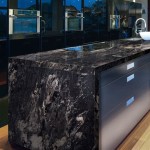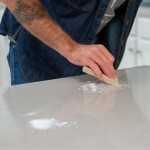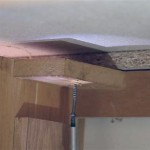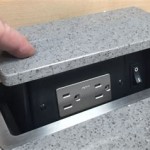How To Clean White Marble Countertops
White marble countertops are a sought-after addition to kitchens and bathrooms, celebrated for their luxurious aesthetic and timeless appeal. However, their porous nature makes them susceptible to staining and etching, requiring diligent cleaning and maintenance to preserve their pristine appearance. Maintaining white marble counters requires more than just wiping down spills; it demands a strategic approach to both routine cleaning and stain removal. This article provides a comprehensive guide on how to clean white marble countertops effectively and safely.
### Understanding Marble's Composition and VulnerabilitiesMarble is a metamorphic rock primarily composed of calcium carbonate. This composition is the reason why marble reacts negatively to acidic substances. Common household items like lemon juice, vinegar, coffee, and even some cleaning products contain acids that can etch or dull the surface of the stone. Etching occurs when the acid corrodes the calcium carbonate, leaving a visible mark or dull spot. Furthermore, marble's porous nature allows liquids to penetrate the surface, leading to staining if spills are not addressed promptly. Understanding these vulnerabilities is paramount in choosing appropriate cleaning methods and products.
The type of finish on your marble countertop also plays a role in its susceptibility to staining and etching. Polished marble, with its high-gloss surface, tends to show etching more readily than honed marble, which has a matte finish. However, honed marble, while less prone to visible etching, may be more susceptible to staining due to its less reflective and more porous surface. Regardless of the finish, preventative measures and proper cleaning techniques are crucial.
### Daily and Weekly Cleaning RoutinesEstablishing a regular cleaning routine is essential for maintaining the beauty of white marble countertops. Daily habits can significantly reduce the likelihood of stains and etching. This routine includes immediate spill cleanup and a simple daily wipe-down.
Immediate Spill Cleanup: The most critical step in preventing stains is to address spills immediately. Use a clean, soft cloth to blot the spill, avoiding any rubbing or wiping, which can spread the substance and potentially worsen the stain. For acidic spills, such as lemon juice or vinegar, neutralize the area first with a baking soda paste (explained below) before blotting. Once the spill is removed, rinse the area with clean water and dry thoroughly with a soft cloth.
Daily Wipe-Down: At the end of each day, or after any significant use of the countertop, wipe down the surface with a pH-neutral cleaner specifically designed for marble or a mild solution of dish soap and warm water. Apply the cleaner to a soft cloth (microfiber is ideal) and gently wipe the entire surface. Avoid using abrasive cleaners, scouring pads, or any product containing bleach, ammonia, or other harsh chemicals. After wiping, rinse the surface with clean water to remove any soap residue and dry with a clean, soft cloth. Leaving soap residue can attract dirt and dull the marble's shine.
Weekly Deep Cleaning: Once a week, perform a more thorough cleaning. This involves applying a marble-specific cleaner according to the manufacturer's instructions. Pay particular attention to areas that are frequently used or prone to spills. After cleaning, rinse the surface thoroughly and dry with a clean, soft cloth. Consider using a marble polishing compound sparingly every few months to restore shine and buff out minor surface imperfections. Follow the product's instructions carefully and test in an inconspicuous area first.
### Stain Removal TechniquesDespite preventative measures, stains can still occur on white marble countertops. Prompt and appropriate stain removal is crucial to minimizing permanent damage. Different types of stains require different approaches.
Oil-Based Stains: Oil-based stains, such as cooking oil, grease, or cosmetics, often appear as dark spots on the marble surface. To remove these stains, create a poultice using baking soda and water. Mix enough baking soda with water to form a thick paste. Apply the poultice to the stained area, covering it completely. Cover the poultice with plastic wrap and tape the edges to secure it. Allow the poultice to sit for 24-48 hours, allowing the baking soda to draw the oil out of the marble. After the designated time, remove the plastic wrap and allow the poultice to dry completely. Once dry, gently scrape off the baking soda with a plastic scraper or spatula. Rinse the area with clean water and dry with a soft cloth. Repeat the process if necessary.
Water-Based Stains: Water-based stains, such as coffee, tea, or juice, can be addressed with a similar poultice, but using a different absorbent material. Instead of baking soda, use diatomaceous earth, which is a naturally occurring, silica-based powder. Mix the diatomaceous earth with water to form a paste and apply it to the stain. Cover with plastic wrap, allow it to sit for 24 hours, and then remove the plastic and let the poultice dry completely. Scrape off the dried diatomaceous earth, rinse the area, and dry it thoroughly.
Acidic Etches: As previously mentioned, acidic substances can etch marble surfaces, leaving dull or light-colored marks. For minor etching, a marble polishing compound may help to restore the shine. Apply the compound to a soft cloth and gently buff the etched area using circular motions. Follow the product's instructions carefully. For more severe etching, professional marble polishing may be necessary. This involves using specialized equipment and techniques to grind down the surface of the marble and restore its original finish.
Rust Stains: Rust stains, often caused by metal objects left on the countertop, can be particularly difficult to remove. A commercially available rust stain remover specifically designed for marble may be necessary. Always follow the manufacturer's instructions carefully and test the product in an inconspicuous area first to ensure it does not damage the marble. In some cases, professional stain removal may be required.
### Protecting Marble CountertopsPreventing stains and etching is always easier than removing them. Implementing protective measures can significantly extend the life and beauty of white marble countertops.
Sealing: Sealing marble countertops is crucial to protect them from spills and stains. A high-quality marble sealant penetrates the stone's pores, creating a barrier that prevents liquids from being absorbed. The frequency of sealing depends on the type of sealant used and the level of use. Generally, sealing should be done every 6-12 months, or as recommended by the sealant manufacturer. Before applying sealant, ensure the countertop is clean and dry. Apply the sealant according to the manufacturer's instructions, allowing it to penetrate for the recommended time before wiping off any excess.
Using Coasters and Placemats: Always use coasters under glasses and mugs to prevent water rings and stains from acidic beverages. Placemats should be used under plates and bowls to protect the countertop from scratches and spills. These simple precautions can significantly reduce the risk of damage.
Avoiding Harsh Chemicals: As a general rule, avoid using any cleaning products that are not specifically designed for marble. This includes bleach, ammonia, vinegar, lemon juice, and abrasive cleaners. These substances can etch or damage the marble surface. Stick to pH-neutral cleaners or mild dish soap and water.
Protecting from Heat: Marble can be susceptible to thermal shock, which can cause cracking or discoloration. Always use trivets or hot pads under hot pots and pans to protect the countertop from heat damage. Avoid placing hot appliances directly on the marble surface.
Regular Maintenance: Consistent cleaning and maintenance are key to preserving the beauty of white marble countertops. By following the daily and weekly cleaning routines outlined above, and by implementing preventative measures, you can keep your marble countertops looking their best for years to come.

How To Clean Marble Countertops Easiest Way Stone Wizards

Restoring Our Marble Counters Honey We Re Home

3 Ways To Clean White Marble Wikihow

How To Clean And Maintain Marble Countertops Youtube

The Pros Cons Of Marble Countertops What I Use To Clean Mine Zdesign At Home

How To Clean Marble Countertops Bob Vila

How To Clean Marble Countertops Ace Hardware Youtube

Marble Countertop Polishing Tips

How To Clean Marble Countertops Homeserve Usa

How To Clean Marble And Remove Stubborn Stains








